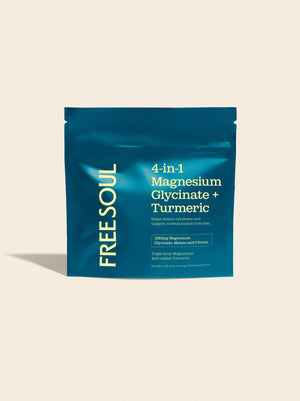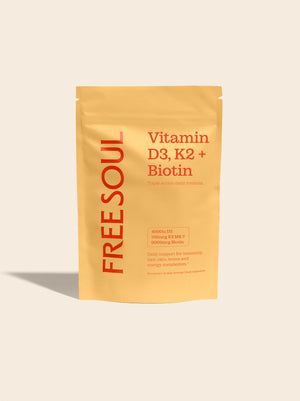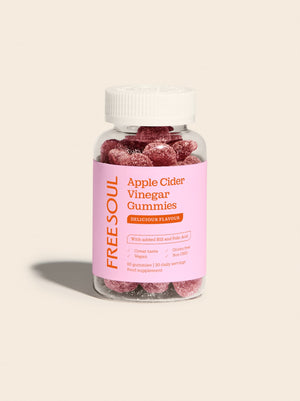At Free Soul, we believe in empowering women with the knowledge and tools they need to lead their best lives. Today, we're diving deep into a topic that affects many women worldwide: Polycystic Ovary Syndrome (PCOS). Marilia Chamon, registered Nutritional Therapist, Gut Health & IBS Expert, shares her helpful guide to help you manage your PCOS symptoms.
What is PCOS?
Polycystic Ovary Syndrome, commonly known as PCOS, is an endocrine disorder that affects women of reproductive age. PCOS is a significant public health problem and is one of the most common hormonal disturbances affecting an estimated 8–13% of women of reproductive age, and up to 70% of cases are undiagnosed. Women with PCOS often have elevated levels of androgens, commonly referred to as "male hormones," even though they are present in both males and females. The most well-known androgen is testosterone.
Common Symptoms of PCOS:
- Insulin resistance
- Irregular or absent menstrual cycles
- Excess androgen levels
- Excess hair growth on the face and other parts of the body
- Acne or oily skin
- Weight gain or difficulty losing weight
- Skin patches
- Infertility
- Cysts on ovaries
Why Does PCOS Happen?
The exact cause of PCOS remains unknown, but several contributing factors play a role:
- Insulin Resistance: Insulin is a hormone responsible for regulating blood sugar. When the body becomes resistant to insulin, the pancreas produces more of it. High insulin levels can cause the ovaries to produce more androgens, like testosterone, leading to PCOS symptoms.
- Inflammation: Women with PCOS often have increased levels of inflammation in their body. This inflammation can stimulate the ovaries to produce androgens.
- Genetic Predisposition: genes may play a role in PCOS development.
How to Determine if You Have PCOS:
If you suspect you might have PCOS, there are several signs and diagnostic methods to consider. Symptomatically, women with PCOS often experience irregular menstrual cycles, excessive facial or body hair growth, acne, and/or weight gain. If you observe any combination of these symptoms, it's essential to consult a healthcare professional.
Diagnostically, doctors typically use a combination of medical history, blood tests, and ultrasounds. Blood tests can measure hormone levels, including androgens, insulin, and others, to check for imbalances commonly seen in PCOS. An ultrasound can visualise the ovaries and check for the presence of multiple small cysts, a common feature of the condition.
It's crucial to note that while these tests can indicate PCOS, a definitive diagnosis usually requires ruling out other potential causes of the symptoms. Early diagnosis and intervention can help manage the symptoms and reduce the risk of associated health complications.
Diet and Lifestyle Tips to Manage PCOS Symptoms:
Diet and lifestyle play a pivotal role in the management of PCOS, primarily because they directly influence the factors that contribute to the condition. PCOS is closely linked to insulin resistance, inflammation, and hormonal imbalances.
The foods we consume and our daily habits can either exacerbate or alleviate these underlying issues. For instance, a diet high in refined sugars can spike insulin levels, worsening insulin resistance, while regular physical activity can enhance insulin sensitivity. Similarly, certain foods can either promote or reduce inflammation in the body.
By making informed diet and lifestyle choices, individuals with PCOS can address the root causes of their symptoms, promoting overall hormonal balance and well-being. It's not just about managing symptoms; it's about creating an internal environment where the body can function optimally, reducing the risk of PCOS-related complications.
- Focus On Fibre: Consuming a fibre-rich diet helps slow down digestion and reduces the impact of sugar on the blood, which can help manage insulin resistance. Think fruits, vegetables, whole grains, legumes, nuts and seeds.
- Limit Refined Sugars and Carbohydrates: Refined sugars and carbohydrates can spike insulin levels. By reducing intake, you can keep blood sugar levels stable, reducing the severity of PCOS symptoms.
- Incorporate Omega-3s: Omega-3 fatty acids can help fight inflammation, another contributing factor to PCOS. Foods high in omega-3 include oily fishes, chia seeds, hemp seeds and walnuts.
- Eat Magnesium-rich Foods: Magnesium is crucial for blood sugar balance and can also help with PMS symptoms. Foods high in magnesium include leafy greens, avocado, pumpkin seeds, and whole grains.
- Stay Active: Physical activity helps lower blood sugar levels, making the body's use of insulin more efficient. This can help reduce insulin resistance, a key factor in PCOS.
- Manage Stress: Stress elevates cortisol levels, which can disrupt other hormone levels. Techniques like meditation or deep breathing can help regulate cortisol and maintain hormonal balance.
- Limit Alcohol Consumption: Alcohol can impact liver function and blood sugar regulation. Moderation is key.
- Consider Supplements: Supplements like inositol can improve insulin resistance, while chromium can help with insulin utilisation. The Free Soul Myo-Inositol Ultra Supplement is a blend of inositol, chromium and folate. Always consult with a healthcare professional before starting any new supplement.
Conclusion
The exact cause of PCOS remains unknown, but several contributing factors play a role. Understanding the root cause of your PCOS is essential, as well as modifying your diet and lifestyle to help you lead a more comfortable life and manage your symptoms.








